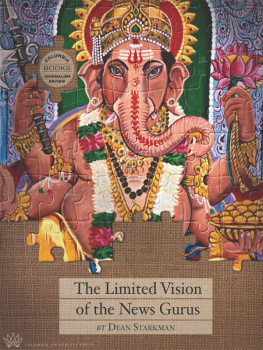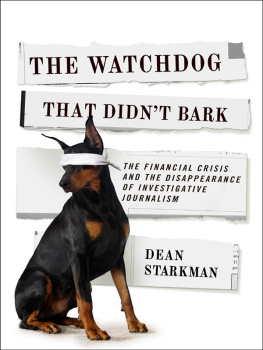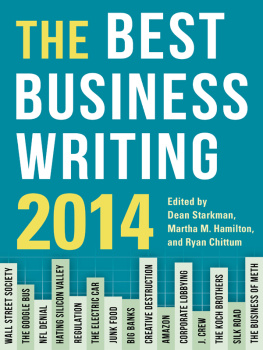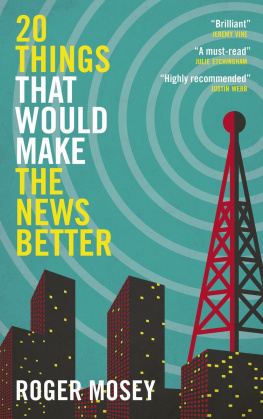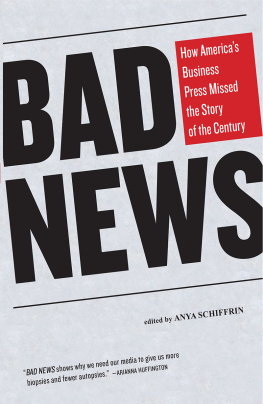Columbia University Press
Publishers Since 1893
New York Chichester, West Sussex
cup.columbia.edu
Copyright 2011 the Columbia Journalism Review
All rights reserved
E-ISBN 978-0-231-52794-1
Cover image courtesy of Chris Mellor/Lonely Planet Images
Cover Design: Michael Keller
Library of Congress Cataloging-in-Publication Data
A complete CIP record is available from the Library of Congress
Columbia Journalism Review Books
A Columbia University Press E-book.
CUP would be pleased to hear about your reading experience with this e-book at .
THE FUTURE OF FUTURISTS
Confidence Game
The limited vision of the news gurus
BY DEAN STARKMAN
The question that mass amateurization poses to traditional media is What happens when the costs of reproduction and distribution go away? What happens when there is nothing unique about publishing anymore because users can do it for themselves? We are now starting to see that question being answered.Clay Shirky
The whole notion of long-form journalism is writer-centered, not public-centered.Jeff Jarvis
As a journalist, Ive long taken it for granted that, for example, my readers know more than I doand its liberating.Dan Gillmor
As career journalists and managers we have entered a new era where what we know and what we traditionally do has finally found its value in the marketplace, and that value is about zero.John Paton
The story is the thing.S. S. McClure
One
Ida M. Tarbell, a writer for McClures Magazine, a general-interest monthly, was chatting with her good friend and editor, John S. Phillips, in the magazines offices near New Yorks Madison Square Park, trying to decide what she should take on next.
Tarbell, then forty-three years old, was already one of the most prominent journalists in America, having written popular multipart historical sketches of Napoleon, Lincoln, and a French revolutionary figure known as Madame Roland, a moderate republican guillotined during the Terror. Thanks in part to her work, McClures circulation had jumped to about 400,000, making it one of the most popular, and profitable, publications in the country.
Phillips, a founder of the magazine, was its backbone. Presiding over an office of bohemians and intellectuals, this father of five was as calm and deliberative as the magazines namesake, S. S. McClure, was manic and extravagant. Considered by many to be a genius, McClure was also just an impossible bossforever steaming in from Europe, throwing the office into turmoil with new schemes, ideas, and editorial changes. I cant sit still, he once told Lincoln Steffens. Thats your job and I dont see how you can do it!
At McClures, there was always, as Tarbell would later put it, much fingering of a subject before the magazine decided to launch on a story, and in this case there was more than usual. The subject being kicked around was nothing less than the great industrial monopolies, known as trusts, that had come to dominate the American economy and political life. It was the summer of 1901.
The natural choice, in the end, was oil. Tarbell had grown up in Pennsylvanias oil country; her father had run a business making oil barrels and a small refinery; her brother worked for one of the few remaining competitors in an industry 90 percent dominated by the greatest of all monopolies, the mother of trusts, John D. Rockefellers Standard Oil Company. She drew up an outline, and Phillips approved. But McClure, recovering from exhaustion, was on a doctor-ordered yearlong rest in Switzerland. Go over, Phillips said, and show the outline to Sam.
I want to think it over, McClure said after Tarbell pitched the idea in a Lausanne hospital. He then announced that they would mull over the story while traveling to Greece, where McClures family would spend the winter. We can discuss Standard Oil in Greece as well as here, he said. So they headed south, stopping along the way for tours of Italys Lake District and Milanthen to rest at the famous Salsomaggiore spa, where they took lengthy mud baths and steam soaks and contemplated just who and what they were about to take on.
Finally, eager to get started, Tarbell cut the trip short. Approval in hand, she returned to New York to begin reporting on what stands, to this day, as the greatest business story ever written.
Ah, old media. Good times. Savin the worl. Remember when a single investigative reporter with the temerity to demand a decent living (McClures paid more than $1 million for the stories in todays dollars) could pull the curtain back on one of the most powerful and secretive organizations on the face of the earth, a great lawbreaker as well as a value-creator? Tarbell is credited with triggering the great antitrust case that finally broke up the octopus in 1911. But her true greatness lies in how, using a mountain of facts carefully gathered and presented, she could explain to a bewildered and anxious middle class the great economic question of her age,.
McClures had planned a three-part series, but, as copies flew off the newsstands, it soon became seven parts, then twelve, then a national sensation. New installments became news events in themselves, covered by other papers, including the fledgling Wall Street Journal. The History of the Standard Oil Company ended up as a nineteen-part series, quickly turned into a two-volume book. A cartoon in Puck would depict a pantheon of muckrakers with Tarbell as a Joan of Arc figure on horseback. Another contemporary magazine pronounced her the most popular woman in America.
No one reading this magazine needs to be told that we have crossed over into a new era. Industrial-age journalism has failed, we are told, and even if it hasnt failed, it is over. Newspaper company stocks are trading for less than $1 a share. Great newsrooms have been cut down like so many sheaves of wheat. Where quasi-monopolies once reigned over whole metropolitan areas, we have conversation and communities, but also chaos and confusion.
A vanguard of journalism thinkers steps forward to explain things, and we should be grateful that they are here. If they werent, wed have to invent them. Someone has to help us figure this out. Most prominent are Jeff Jarvis, Clay Shirky, and Jay Rosen, whose ideas well focus on here, along with Dan Gillmor, John Paton, and others. Together their ideas form what I will call the future-of-news (FON) consensus.
According to this consensus, the future points toward a network-driven system of journalism in which news organizations will play a decreasingly important role. News wont be collected and delivered in the traditional sense. It will be assembled, shared, and to an increasing degree, even gathered, by a sophisticated readership, one that is so active that the word readership will no longer apply. Lets call it a user-ship or, better, a community. This is an interconnected world in which boundaries between storyteller and audience dissolve into a conversation between equal parties, the implication being that the conversation between reporter and reader was a hierarchical relationship, as opposed to, say, a simple division of labor.

At its heart, the FON consensus is anti-institutional. It believes that old institutions must wither to make way for the networked future. The hallmark of revolution is that the goals of the revolutionaries cannot be contained by the institutional structure of the existing society, Shirky wrote in Here Comes Everybody, his 2008 popularization of network theory. As a result, either the revolutionaries are put down, or some of those institutions are altered, replaced or destroyed. If this vision of the future does not square with your particular news preferences, well, as they might say on Twitter, #youmaybeSOL.
Next page
